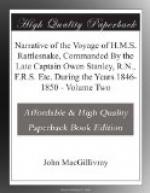June 8.
One party continued employed in getting the remainder of the things across the river, whilst the others went in search of the horses, which had rambled to some distance to seek for better grass. The grass had hitherto continued plentiful in places all the way. The horses were brought up to the river by eleven A.M., and were with some difficulty got across; after which they were hobbled, and we camped for the night near the beach, in good grass.
June 9.
Mr. Kennedy, with Jackey and three others, left the camp this morning for the purpose of ascertaining the most practicable route for our carts. During the day a great number of natives came around our camp, but appeared very friendly; they are a finer race of men than those usually seen in the southern districts of the colony, but their habits and mode of life seem very similar. They left us before dark, without making any attempt at plunder.
June 10.
Mr. Kennedy returned to the camp this evening; he still found the swamps were impassable, the water and mud lying on them in many parts, from three to four feet deep; there were patches of dry land here and there covered with good but coarse grass.
We saw here large flocks of black and white ducks, making a whistling noise similar to some I have seen near Port Macquarie; Mr. Wall shot three of them, and they proved very good to eat, but they were not new, belonging to the genus Dendrocygna eytoni.
June 11.
We started early this morning and proceeded along the beach for three or four miles, when we came to another river, similar in its character to the one we crossed on the 8th, with low sandy banks, and dry bushy land on each side. We unloaded and hobbled our horses, and prepared our punt as before.
Near to this spot we came to a native encampment, consisting of eighteen or twenty huts of an oval form, about seven feet long, and four feet high; and at the southern end of the camp, was one large hut eighteen feet long, seven feet wide, and fourteen feet high. All of them were neatly and strongly built with small saplings stuck in the ground, arched over, and tied together at the top with small shoots of the climbing palm, which I have already described. They were covered with the bark of the large Melaleucas which grow in the swamps, fastened to the saplings with palm shoots. A small opening is left at one end, from the ground to the top, and the floors were covered with long dried grass.
The natives being absent from the camp, I entered the large gunyah, and found in it a large shield of solid wood, two feet in diameter, convex on one side, and flat on the other. The convex side was curiously painted red, in circular rings and crosses. On the flat side was a handle, cut out of the solid wood. In the same hut I found four wooden swords, three and a half feet long, and four inches broad, sharp at both edges, and thick in the centre, with a slightly curved, round handle, about six inches long. They were made of very hard wood, and were much too heavy to wield with one hand. I also found a number of fishing lines, made from grass, with hooks attached of various sizes, made from mussel shells.




